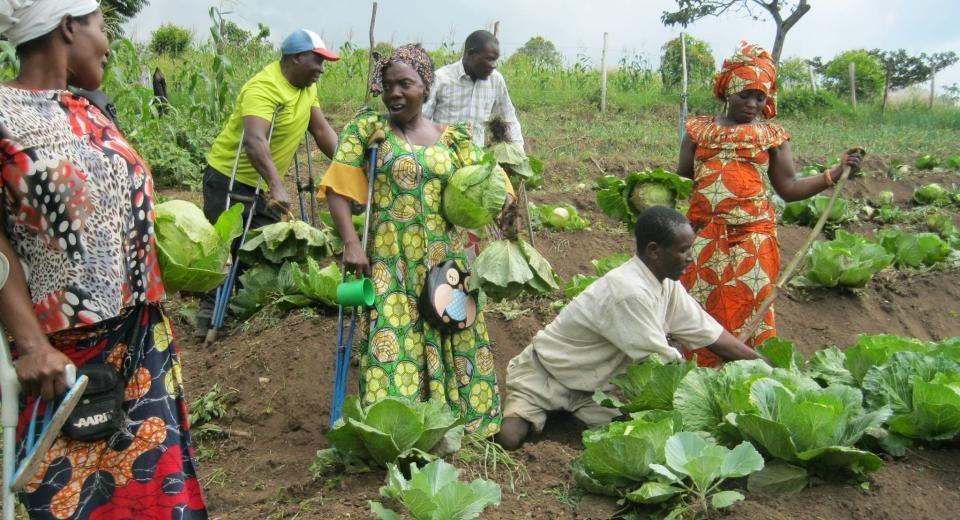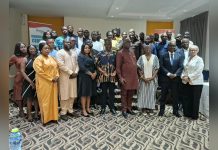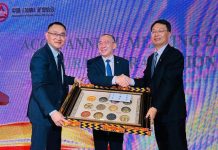
Africa-Press – Ghana. In the heart of Ghana’s rural economy, agriculture beats as a lifeline, providing food, livelihoods, and purpose. Yet, as fields yield harvests and agribusinesses grow, a significant segment of the population remains left behind.
Women with disabilities (PWDs), particularly the youth, remain on the fringes of the agricultural value chains, not for lack of interest or ability, but because of systemic barriers deeply rooted in social norms, economic exclusion, and institutional neglect.
This was the stark reality highlighted in the recently launched HAPPY (Harnessing Agricultural Productivity and Prosperity for Youth) Programme Report, an initiative of the Mastercard Foundation in partnership with Agri-Impact Limited, which presents a sobering yet hopeful assessment of disability inclusion in Ghana’s agricultural landscape.
Double Disadvantage: The Gender and Disability Intersection
Women with disabilities in Ghana often face a unique and layered marginalisation. Not only are they discriminated against because of their gender, but their disabilities further limit their access to agricultural land, credit, training, and markets.
“Female PWDs are caught in a cycle of exclusion that begins with cultural perceptions and ends in economic dependency,” the report noted.
Traditional land ownership structures often favour men, and even when opportunities arise, disabled women are rarely considered. As a result, many young women between the ages of 18 and 35 find themselves trapped, willing but unable to contribute meaningfully to the sector that feeds the nation.
In Ghana’s Northern Zone, the challenges are even more acute. Limited infrastructure, information gaps, and weak institutional support make it difficult for young PWDs, especially women, to access the tools and opportunities they need to thrive.
Breaking Stereotypes, Unleashing Potential
The HAPPY Programme’s assessment found that societal perceptions about disability remained one of the most persistent barriers. PWDs are often viewed as incapable of contributing to agricultural productivity. For women, these perceptions are magnified by patriarchal norms that restrict their mobility, voice, and visibility.
However, these stereotypes couldn’t be further from the truth. “There is a strong willingness among young PWDs to engage in agriculture, particularly in value-added roles like processing and marketing,” said the report.
These roles not only required less physical labour but also tap into areas where PWDs can excel, organisation, coordination, and innovation.
Young women with disabilities have expressed interest in agro-processing, managing distribution channels, and starting agribusiness ventures.
But interest alone is not enough. The report warns that unless adaptive tools, training, and financing are made accessible, this untapped potential will remain just that, untapped.
Policy Gaps and Opportunities
The report presents a suite of comprehensive policy recommendations aimed at transforming the sector into an inclusive space where no one is left behind.
From land allocation quotas for PWDs and input subsidy programmes, to tailored financial products and adaptive equipment grants, the path toward inclusion is well-charted. What’s missing is political will and coordinated implementation.
Key among the immediate actions recommended is the prioritisation of accessibility and adaptive technologies across all zones. Without tactile guides, lightweight ploughs, and voice-activated tools, many women with disabilities will continue to face barriers that are entirely preventable.
Importantly, the report also calls for childcare support for female PWDs and gender quotas for access to land and training. These gender-sensitive interventions recognise the disproportionate burden placed on women and offer practical solutions to ease their entry into agricultural livelihoods.
Community, Culture, and Change
Inclusion is not merely a policy issue, it’s a cultural one. The HAPPY Programme underscores the need for community sensitisation campaigns to shift public perceptions about disability. Traditional leaders, religious heads, and media organisations must be part of a national conversation that redefines ability, uplifts female PWDs, and dismantles stigma.
Success stories of women with disabilities thriving in agribusiness must be amplified across radio, TV, and digital platforms. Visibility fosters acceptance. Acceptance births opportunity.
A Strategic Economic Priority
Including women with disabilities in Ghana’s agricultural value chain is not just the right thing to do, it’s a strategic move for national development. It aligns directly with the Sustainable Development Goals, particularly SDG 8 (Decent Work and Economic Growth) and SDG 10 (Reduced Inequalities).
“When PWDs, especially women, are given a fair chance, they don’t just survive, they thrive,” the report insists.
A Call to Action
The HAPPY Programme’s recommendations are a blueprint for change, but they require action, urgent, coordinated, and inclusive.
The Ministry of Food and Agriculture, traditional authorities, NGOs, and private agribusinesses must come together to dismantle barriers and unlock opportunity.
Women with disabilities are not liabilities. They are leaders in waiting. With the right support, they can contribute meaningfully to Ghana’s agricultural transformation and help build an equitable society for all. Because in the agricultural fields, there is room for every hand.
The Harnessing Agricultural Productivity and Prosperity for Youth (HAPPY) is an initiative of the Mastercard Foundation in partnership with Agri-Impact Limited, aiming to create dignified and fulfilling job opportunities for 326,000 youth aged 15-35 within Ghana’s agricultural sector.
Source: Ghana News Agency
For More News And Analysis About Ghana Follow Africa-Press






